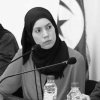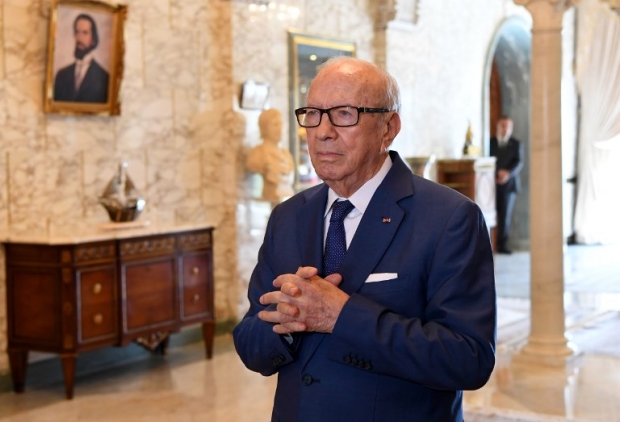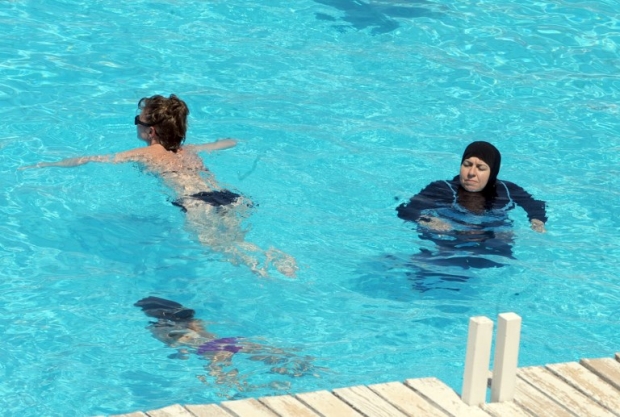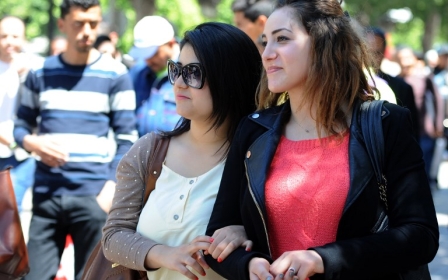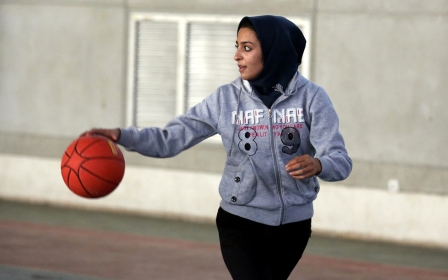Yes, the choice to wear a hijab is also a woman's right
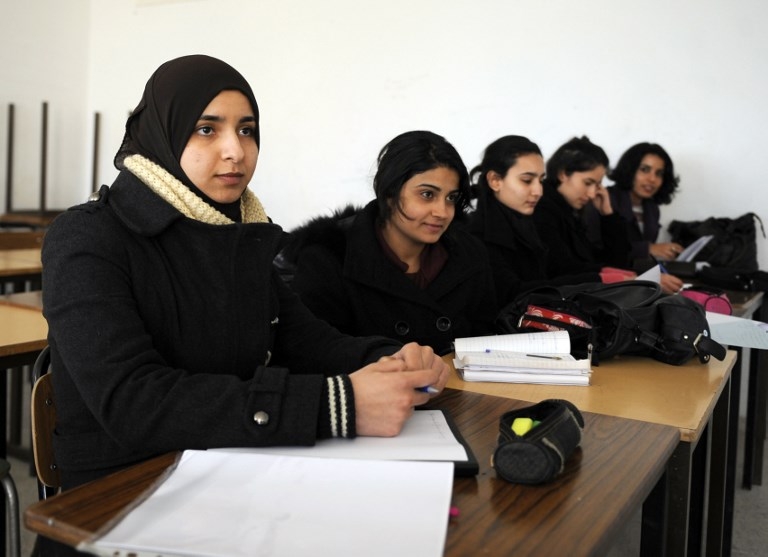
On the National Day of Women in Tunisia earlier this month, President Beji Caid Essebsi called for establishing equal inheritance and abolishing the decree prohibiting Tunisian women from marrying non-Muslim men.
Ironically, Essebsi, who wants to leave a legacy as the liberator of women while also eyeing the next elections, is no stranger himself to misogynistic behaviour.
In October 2014, Essebsi was asked for his opinion about remarks made by Mehrziya Laabidi, then-vice president of the National Constituent Assembly, regarding his time as prime minister during the “transitional” period following the 2011 revolution. Without making any reference to the content of her remarks, he replied with “What can I say? She’s just a woman.”
Essebsi is certainly the wrong person to be given credit for women’s empowerment, but equal inheritance and the choice to marry whoever we want are two major steps towards that end and they should not be disregarded.
However, rather than focusing solely on personal status laws, which are often instrumentalised for political ends, the focus should also cover issues that are not necessarily as attractive to the Tunisians involved in these campaigns, or the Western newspapers and governments who have praised Essebsi.
Hijab humiliation
“It will end your life.” That’s what people told me when I decided to wear the hijab 14 years ago. In 2003, Circular 108, the presidential decision to ban the hijab in public, was in full effect and the end of the Western-backed Ben Ali regime was nowhere in sight. The extreme results of the implementation of Circular 108 included imprisonment, loss of employment and physical abuse by the police.
In secondary school, the strategies included arriving late when the entrance was unguarded, sneaking from backdoors, jumping off fences or wearing caps and berets
The less known effects of this policy were in no way less extreme. Girls with hijab were stopped in the streets, humiliated and dragged into police stations. For students, getting to classes by itself was a challenge. In secondary school, the strategies included arriving late when the entrance was unguarded, sneaking in the backdoors, jumping off fences or wearing caps and berets.
In my high school years, the principal was known for his rigorous anti-hijab policies. Using insults like “cow”, “rug-wearing” and “regressive” to refer to moutahajiba (hijab wearing) students was normal practice. He even decided to let some dogs loose near the fences to prevent “intruders”. The few of us who wore hijab were forced to completely remove it in school.
The humiliation of walking next to your classmates, then removing what you consider to be a piece of you in front of everyone does not really go away. Being spotted with a hijab outside of the school was also grounds for taking away your hijab, expulsion and parental presence.
Being a moutahajiba defined your whole experience in high school. If attending basic classes was a challenge, then extra-curricular activities were out of the question. In my final year there, I was invited for the award ceremony. My name was called and I walked to the podium to receive the prize for academic achievement. I stood there in front of hundreds of people, and waited.
Instead of handing me the award, a school official turned his head and refused to even acknowledge my presence. Looking back at my high school years, I should be reminiscing about student life, friends and teachers. Instead, all I can think of is that moment, that feeling of not belonging and not being accepted.
University was different, but by no means better. For the majority of universities during the last few years of the regime, hijab was allowed. However, being subjected to professors’ insults and getting denied programme admissions and scholarships was common and contesting that was basically impossible.
Laws change, intolerance remains
In 2011, the Tunisian revolution brought back hope that things would be different. On 31 March 2011, wearing the hijab in your National Identification Card photo was declared legal. Circular 108 was revoked and women with hijab were finally able to pursue their academic and professional careers without harassment.
He called the hijab 'regressive', 'unsightly', 'un-chic' and 'a liability' and said it conveyed backward ideas
But that doesn't mean things have changed. A close friend of mine, Amira, a 29-year-old engineer, recently told me how she has been refused for several job positions because of the hijab. She claims that when she walks in for an interview, some recruiters don't even hide their reactions when they see she is veiled. In IT circles, there are companies that do not even deny these policies to applicants. Today, stories like Amira’s are met with scepticism. These women are told they are being paranoid and that they should get over it.
In 2013, I enrolled in an international relations programme at a Tunisian university. The programme’s main purpose was to prepare students for a career in NGOs or in the Ministry of Foreign Affairs - unless you wear hijab, that is. The intolerance of some professors towards the hijab was heartbreakingly familiar.
In one of the courses, one teacher regularly attacked moutahajiba students, making a point of reminding us on several occasions that we would never make it in the world with "that thing" over our heads. He called it “regressive”, “unsightly”, “un-chic” and “a liability” and said it conveyed backward ideas. This attitude was not foreign to Tunisian academia and, sadly, it was not surprising to the targeted students.
The most striking moment was when he explicitly told us not to waste our time by taking the diplomats’ exam, claiming that even if a moutahajiba passed the written exam, she would be failed on purpose in the oral exam. When I asked him to explain why, he said the jury committee would never pick candidates with hijabs, even those who were good - or better - than their classmates.
"You will never become a diplomat because you do not represent Tunisian women and you cannot represent Tunisia. The only position available to you would be a desk job somewhere in the ministry’s offices," he said.
This came as a shock to several students who were planning to have diplomatic careers. In another stunt, while preparing for a classroom UN simulation, he required the moutahajibas who were representing foreign countries to remove their hijabs for the day to make it more believable. He then used the unrest and horror that followed as “evidence” to show how we were unable to integrate in society in a healthy way since we couldn't even participate in a simple game.
'A hygiene issue'
When I finished my courses, I thought that I was leaving all of this behind, that the feeling of being shackled would finally come to an end. After all, Tunisia was making so much progress when it came to women’s rights. This July, I was invited by some friends for a lunch and pool time at a hotel in Gammarth, a resort town on the Mediterranean.
At the entrance, the staff informed me that moutahajibas were not allowed in the swimming pool. It took a moment for that to sink in. I asked inside and was told that the policy preventing moutahajibas from swimming had been implemented last year because of complaints from tourists.
However, after we asked more questions, we realised that, in fact, a former manager of the hotel had implemented the policy because he believed that moutahajiba swimsuits are dirty and sweaty and should not be allowed in the pool. I was told that a decree by the Ministry of Tourism had been the basis for this policy.
I called the hotel and asked to speak to the current manager, but the general director of the hotel did not pass me through. I told her I wanted to inquire about the alleged decree and the legal background of it. Her answer, reminiscent of the racist justifications for segregated pools in the US, was “By law? We can do whatever we want.” “It’s a hygiene issue," she added.
I decided to consult Sana Haddad, a lawyer, who told me that these institutions are using their own interpretation of the hygiene regulations for swimming pools to ban the hijab swimsuit. She believes that fighting this discrimination as a violation of civil rights in court is possible, but of course you have to have the financial means to go through the process.
Hotels are not the only places moutahajibas are not allowed. Some nightclubs and bars mainly in Tunis and Hammamet, another seaside town, have similar no-hijab policies. When we talk about contesting these policies socially or legally, we need to keep in mind that a woman, moutahajiba or not, may not always feel empowered to go public because of familial or social pressures.
In whose vision?
In his justifications for the new initiative, Essebsi claims to be preserving something unique about Tunisia - that it is the most advanced Arab Muslim country when it comes to women’s rights. But just like Ben Ali and Bourguiba before him, what those rights should look like are all envisioned by men in their twilight years.
His initiative announced on women's day is the verbal equivalent of Bourguiba’s most iconic photograph, where he personally removed the traditional head-cover (Sefseri) from a woman's head. Both initiatives ignored and marginalised the role of women and popular women’s struggles against patriarchy, instead presenting themselves as the “saviours” of women.
But just like Ben Ali and Bourguiba before him, what those rights should look like are all envisioned by men in their twilight years
Tunisian rulers and elite might feel that enacting this legislation will appease a West that claims to be concerned about women’s rights in the region despite the numerous instances demonstrating how such concern has been used to further their own interests. If a country is an ally, the West is all too willing to disregard human rights violations, including women's rights. Just consider Saudi Arabia.
Their fear of Islamic-related attires is a manifestation of internalised colonialism that is backed and encouraged by the Western powers’ silence, before and after the revolution. It is worth mentioning that the hijab-swimsuits are also banned is some areas in France, and even in supposedly liberal countries such as Germany, Switzerland and Austria.
This is not helped by the fact that they are being called “burkinis”, automatically linking them to the controversy of the burqa, even though they are completely different things.
Wearing the hijab for 14 years might have restricted me academically and socially, at least to some extent. But it freed my mind and made me who I am today. It opened my eyes to the hypocritical nature of Tunisia’s “liberation of women” and to the limited gaze of the West. It taught me that to really be free means not to wait for a male leader to dictate my rights or for the world to define me.
The notion of women’s liberation that has always been imposed by the state is constricting and limiting. It’s about making sure it’s either this or that. But maybe there are women who want all of that, not just a modified version of a fake freedom. Maybe there are women out who want the right to wear the hijab, to work, to go to bars, to marry life-partners of their choosing and to get the financial and social recognition that they deserve.
The hijab is a choice. So maybe it’s time for people to realise that not all of us need “saving” from the hijab, what we demand is respect, equality and justice.
- Safa Belghith works as a journalist and research consultant on issues related to Tunisian politics, women’s rights and media reform.
The views expressed in this article belong to the author and do not necessarily reflect the editorial policy of Middle East Eye.
Photo: Tunisian students listen to their French language teacher at university in Tunis in January 2012. (AFP)
This article is available in French on Middle East Eye French edition.
Middle East Eye propose une couverture et une analyse indépendantes et incomparables du Moyen-Orient, de l’Afrique du Nord et d’autres régions du monde. Pour en savoir plus sur la reprise de ce contenu et les frais qui s’appliquent, veuillez remplir ce formulaire [en anglais]. Pour en savoir plus sur MEE, cliquez ici [en anglais].


